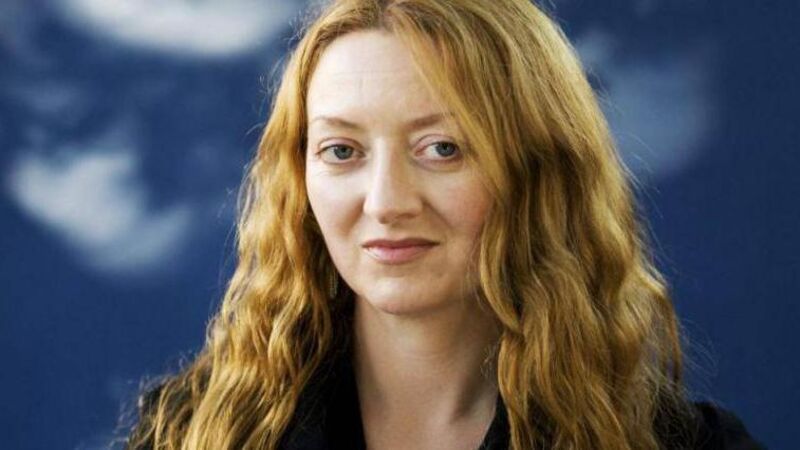Colin Sheridan: Debt to mothers will take generations to repay

Claire Keegan wrote the novella that the film, 'Small Things Like These', is adapted from.
There's an image you are going to see a lot of in the coming months, and it’s of Cillian Murphy, just not as you’ve seen him before.
No, it’s not of the Ballintemple man as physicist J Robert Oppenheimer, nor of him accepting an Oscar — which is very possible.
The image of which I speak is of him wearing a non-descript black hat, a workman’s jacket, and the pained expression of a man tortured by pain, guilt, and a smothering self-doubt.
It’s a look that Irish men do well, apparently, though few of us could claim Murphy’s cheekbones or baby-blue eyes.
This depiction is of a man named Bill, a coalman in Wexford in the early 80s, and it’s sure to have a global reach and resonance — the likes of which only a movie star like Murphy could bring.
The movie is a screen adaptation of Claire Keegan’s novella Small Things Like These, which debuted at the Berlin Film Festival.
Keegan’s novella tells a story of a noble man grappling with his own past, and the uncovering of a dark secret on his doorstep.
Delivering fuel on a Christmas Eve, he visits the same convent he does every other week. Attached to it, a training school and laundry where young women live and work.
There are all kinds of rumours locally about those housed there — “girls of low character” or “common, unmarried girls” who were hidden away after giving birth.
Bill, a father of five girls himself, bears no judgement.
The terrible conditions these mostly invisible girls are forced to live under are revealed when he stumbles upon one of them locked away in the convent’s coal shed, distressed, barely able to walk, and asking to see her baby.
On the eve of the world premiere of the movie adaptation in Berlin, Murphy said the following; “I do think that it [the Magdalene Laundries] was a collective trauma, particularly for people of a certain age. I think that we’re still processing that,” before adding that art could be a useful “balm for that wound”. I remember first reading the novel, and had been most shocked by the fact it was set in the 1980s — a decade I was born into.
A childhood enacted oblivious to an evil that lurked, unchecked, behind convent walls and church school gates.
It may seem obsolete, yet sadly apposite, to point out that Murphy’s Bill — a man — is the reluctant hero of a book that is so profoundly about women, Irish women, and the things they carried for decades and decades.
A book that ever so slowly pulls back the curtain on the most damning chapter of this country’s contemporary history — its abuse of vulnerable children, and young mothers in particular.
The film, which is the first Irish production to open the Berlin film festival, was adapted for screen by Cork playwright Enda Walsh, and produced by Matt Damon and Ben Affleck’s Artists Equity studio. All men, though perhaps necessary for the movie to get made.
Two weeks ago, two women much younger than I shared their story on the Tommy Tiernan Show.
Eight years ago, Nessa Hurley and Anne O’Connell met online and became friends.
Hurley was always aware she was adopted and, curious to know her origin story, she followed the criteria available to her to ascertain as much as she could about her biological family.
If you were unaware of the story, as I was, you couldn’t help but share the shock she felt when she got a call from the adoption authorities in 2022 which revealed that O’Connell was her birth sister.
Two babies, separated at the Bessborough mother and baby home in Cork, reunited by a random phone call two years ago.
Truth, stranger than fiction, and a timely reminder this Mother’s Day weekend that the debt this country owes to mothers is one that will take generations to repay.
Speaking of their birth mother, O’Connell said: “She’s a warrior.
“All those women who went through what they went through, were just incredible. It must have taken everything, and they’re still living with it.”
I’ll freely admit to being the first to bang the drum about generational trauma in the likes of Palestine and elsewhere, without fully understanding the horror of what was perpetrated just over the wall in towns and villages across Ireland for over a century.
The fact it was still being practiced, while so many of us grew up in blissful ignorance, is a shameful reckoning many of us have avoided. There will be a lot of empty rhetoric this weekend about how wonderful our mothers are — Irish mothers in particular. Perhaps it’s time we recognised in some relatable, teachable way, that they were long failed by both the State and society.
That the very women we expect to queue at schools to pick up our kids — their grandkids — were themselves victims of a litany of genuine crimes, ranging from casual corporal punishment to the brutal neglect and abuse inflicted upon the child Cillian Murphy finds cowering in the coal shed.
CONNECT WITH US TODAY
Be the first to know the latest news and updates






